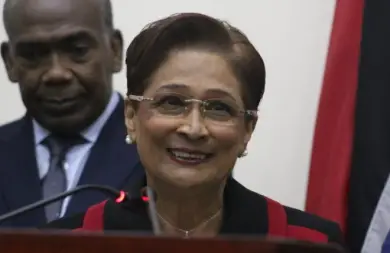PORT OF SPAIN – Trinidad and Tobago’s Prime Minister Kamla Persad-Bissessar has made it clear that her administration will pursue a foreign policy defined by national interest, even as critics accuse her of undermining regional unity within Caricom.
At the heart of the controversy is Port of Spain’s support for Washington’s recent deployment of advanced naval and air assets to the Caribbean. The United States announced the move as part of a crackdown on Latin American drug cartels, but the decision has sharply divided opinion across the region.
Persad-Bissessar, whose coalition came to power earlier this year, has remained unapologetic. Speaking on local television, she argued that after two decades of bloodshed and rising crime, Trinidad and Tobago could no longer afford half-measures. “We are drowning in violence,” she said. “Partnering with the Americans is not betrayal—it is defense.”
Regional Fractures Exposed
Her stance has fueled accusations that she has weakened Caricom’s collective voice, but Persad-Bissessar insists the fault lines were already visible. Several Caricom nations, such as St Lucia, Grenada, and Dominica, are members of the ALBA bloc, which recently convened to show solidarity with Venezuela and condemn U.S. actions.
Cuban President Miguel Díaz-Canel and Venezuelan President Nicolás Maduro both argued that the U.S. buildup went beyond counter-narcotics and risked destabilizing regional peace. Persad-Bissessar dismissed such warnings, countering that Caricom’s own strategies had failed to stem gun-running and narco-trafficking, which she described as “engulfing the Caribbean in flames.”
“Trinidad and Tobago First”
The prime minister has also framed the issue as one of sovereignty and responsibility to her citizens. She pointed to the social and economic costs of hosting thousands of Venezuelan migrants, many of them undocumented, and insisted that her five-year mandate would place citizens’ safety above regional politics.
“Our foreign policy will be dictated by what serves Trinidad and Tobago first,” she declared, citing recent violent crimes as evidence of a crisis demanding urgent solutions.
Political Backlash
Former prime minister Dr. Keith Rowley and other opposition figures have accused her of double standards and of bending to U.S. interests. Persad-Bissessar responded by recalling instances where Caricom itself appealed for American help in combating arms trafficking. “You cannot declare gun violence a public health emergency, then denounce decisive action when it comes,” she said.
Looking Ahead
For now, Caricom has not issued a formal response to the U.S. military presence. But the debate has spotlighted deep divisions in the region over security, sovereignty, and the balance between multilateral cooperation and national priorities.
Persad-Bissessar appears unshaken. “Whether others agree or not, my responsibility is to the people of Trinidad and Tobago,” she said, standing by her decision to align with Washington’s latest move.

